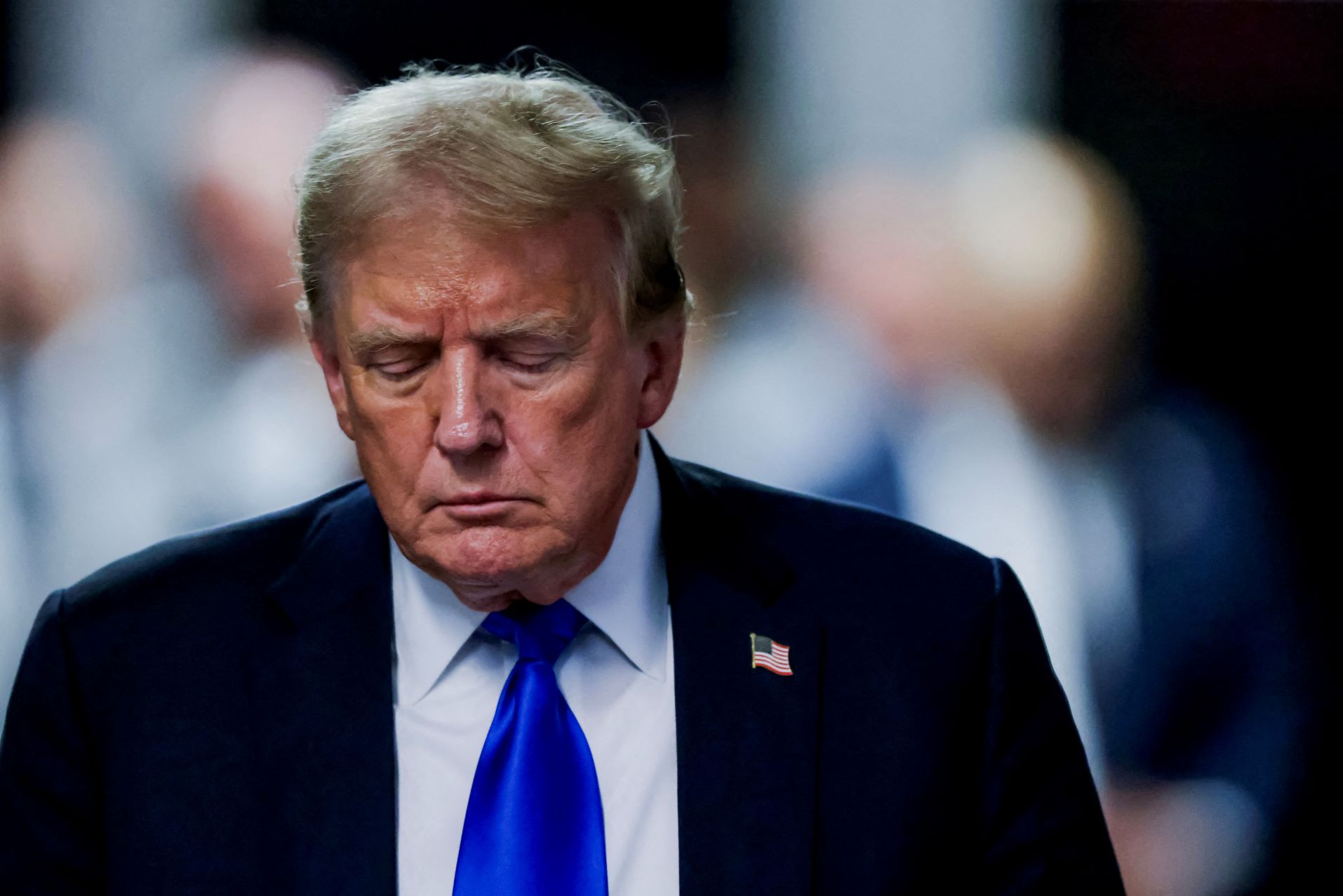Last week former U.S. President Donald Trump was convicted on thirty-four counts of falsifying business records, an unprecedented development that has injected uncertainty into the 2024 presidential race. Three Council of Councils (CoC) experts reflect on the regional impact of the Trump conviction in this CoC global perspective series.

A Blow to Global U.S. Standing
As an historian of the United States, I believe this is a significant moment. Trump is the first former president to be charged and convicted with felony crimes. “I could stand in the middle of Fifth Avenue and shoot somebody,” Trump bragged in 2016, “and I wouldn’t lose any voters, okay? It’s, like, incredible.” In this case, Trump hasn’t shot anyone. But his boast of impunity will be tested in November.
In the rest of the world, the conviction will be another blow to the regard in which the United States is held.
To be sure, Trump’s conviction demonstrates that no American—no matter how rich or influential—stands above the law. However, the fact that so many Americans believe his trial was a witch hunt and a sham shows the degree to which Trump’s cynicism has corroded American public life. His return to the White House would further tarnish the international image of the great republic.
Just as important as the power of the United States, I have always believed, is the idea of the United States: a democratic superpower; a flawed country that is always reaching for perfection; a nation of awesome might but also dignity and restraint; a republic with republican values. What would happen to those republican values in the wake of a Trump victory?
U.S. allies are deeply concerned about the policy implications that would flow from Trump’s return to the White House. Previous presidents have defined the United States’ self-interest broadly. But how can the rest of the world find our place in his “America First” worldview?
Most Australians support the U.S. alliance, and Australia is the United States’ most reliable ally: the only country to fight beside the United States in every major conflict of the twentieth and twenty-first centuries. However, Trump’s values run counter to Australians’ values. Trump is an alliance skeptic; Australians are alliance believers. Trump is hostile to free trade; Australia is a trading nation. Trump swoons over autocrats and strongmen; Australia is an old democracy and a free society.
Australians lost some confidence in the United States during the Trump presidency. In 2020, Lowy Institute polling found that nearly half of Australians did not trust the United States to act responsibly in the world. The 2024 Lowy Institute Poll, released this week, reveals that if Australians had a vote in November, nearly seven in ten would vote for Joe Biden.
Canberra will deal with whomever Americans elect as their president, of course. But most Australians will be hoping that Trump’s conviction damages his chances.
Increasing Anxiety About the Special Relationship
The news that former U.S. President Donald Trump had been found guilty on all thirty-four criminal counts added to a rapidly growing anxiety in the United Kingdom that the future of its closest security relationship is uncertain and, if Trump is reelected, unpredictable.
This comes at a bad time for the United Kingdom, which is embroiled in its own election, scheduled to take place on July 4. Since Brexit, successive UK leaders have struggled to define Britain’s role in the world, and especially its relationship with the United States. As part of his Global Britain agenda, former Prime Minister Boris Johnson tried to distance the United Kingdom from the United States. As the reality of Britain’s self-inflicted isolation unfolded, Johnson and his successors changed course and sought to strengthen those bonds. This includes with MAGA Republicans, the staunchly pro-Trump Republican flank. Britain’s pragmatism was on full display in April when Foreign Secretary David Cameron took a surprise visit to Mar-a-Lago in an attempt to persuade Trump to give his backing to congressional action in support of Ukraine.
But what now? In the short term, it is complicated. The UK is in a tight spot at home and abroad. Stalled economic growth, a country in dire need of foreign investment, a war in Ukraine that has deepened Europe’s dependence on the United States, and a difficult relationship with the European Union, all lead to the obvious conclusion: a strong relationship with the United States is essential and the United Kingdom cannot afford to be partisan when it comes to the U.S. leadership.
But the relationship with Trump has long been fraught. And during the UK electoral season, courting an unpopular former president who is now a convicted felon is even more complicated. The British public are notoriously ambivalent about American power and Britain’s dependence on it. Trump’s willingness to interfere in UK politics did not make him popular when he was president, and it will not make current or future British leaders who associate with him any more popular for doing so. This dilemma will not disappear, and the upcoming NATO summit in Washington, marking its seventy-fifth anniversary, will be an early challenge for the next UK leader, whoever that could be, to manage a United States deep in campaign season.
For Europe, including the United Kingdom, Trump’s new status as a felon only deepens the existential crisis that most of the continent is feeling as the U.S. elections approach. The United States’ role as a beacon of democracy and human rights, a partner, and a provider of security, feels increasingly fragile. Europe will be seeking to gauge how permanent change in the United States is likely to be. An election in which not only swing state voters, but also wealthy American donors, choose to ignore the judgment of its own courts on the moral standing of their party leader will send a strong signal to America’s closest partners in Europe if Trump is elected.
Developing a pragmatic strategy for engaging with its friend across the pond will be essential. In doing so, Europe should preserve space for its own liberal values. But in an era of heightened geopolitical rivalry, where the alternatives to American power are worse and by orders of magnitude, Europe cannot escape its dependence on the United States.
In Europe, Bracing for a Debased Discourse on Democracy
Donald Trump’s guilty verdict has caused a big splash in Europe. It is too early to say whether it will also have an impact, though. For now, one can only make an educated guess about indirect implications.
First, it could fuel a European perception of U.S. politics in which polarization has now definitely transcended political divisions and affects the constitutional balance of the republic. This perception could feed concerns that the Joe Biden administration may not have the political wherewithal to resolutely pursue the foreign policy objectives most critical to Europeans, namely the defense of Ukraine and a sustainable ceasefire in Gaza—at least until November.
Second, it could legitimize the proposition that democracy across the transatlantic political space is about electoral politics and not the rule of law. Rather than a system balancing separate powers and guaranteed by law, this proposition constructs democracy as the regime in which the will of the people (which is, moreover, always partial and often a minority) replaces the rule of law. Popular following is as important as lawyers—in fact, more important than lawyers—as electoral success is akin to a court of appeals that acquits the powerful even if they were convicted. Trump’s professed martyrdom as the victim of a politicized justice could easily become a term of reference for parties in Europe that share this debased discourse on democracy, which has already advanced further in places such as Hungary and, until recently, Poland. From this point of view, the response of the Republican Party and Trump to the verdict, rather than the verdict itself, could usher in a season in Europe in which democracy will increasingly become an empty vestige of a political discourse imbued with nationalism, nativist intolerance, and authoritarianism.
Third, the reverse could occur to those in Europe opposed to the nationalist and nativist parties, who see in Trump an America they do not understand and from which they feel irremediably distant in values. In the long run, this could loosen the bonds of mutual trust and reorient the preferences of some states—or at least some parties—in Europe toward a transactional relationship with the United States. This would make it harder to sell to the public that transatlantic cooperation, is necessary to maintain an international system in which democracy is safe.









